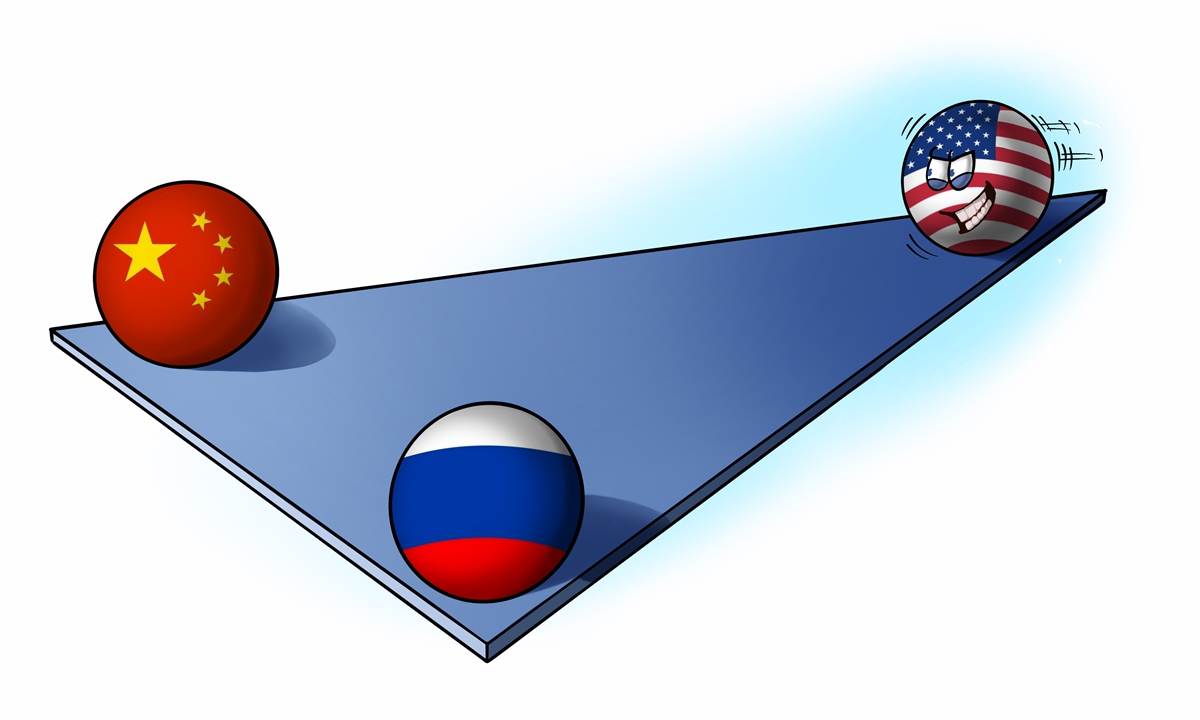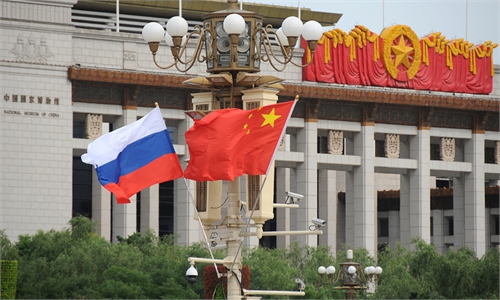
Illustration: Liu Rui/GT
"Let us [China and Russia] roll up our sleeves and work harder, in a bid to carry forward the friendship between our two peoples from generation to generation." Russian Foreign Ministry Spokesperson Maria Zakharova said in Chinese on Friday during her weekly briefing, when talking about the China-Russia Treaty of Good-Neighborliness and Friendly Cooperation.
Russia recently has made many words and deeds supporting China and the friendly bilateral ties with China. For example, Russian President Vladimir Putin has approved an updated Russian National Security Strategy, with the corresponding decree published on the state portal of legal information on July 3, according to Sputnik News. The updated document includes the expansion of strategic cooperation with China and India in a list of Russian foreign policy priorities.
"If somebody gives me just one example of the Communist Party of China imposing its ideology on anybody outside Chinese borders, I would be very grateful," Russian ambassador to China Andrey Denisov said on July 4 when attending the World Peace Forum held in Beijing. It was Denisov's response to some groundless accusations that China exports its governance model to other countries.
These indicate that Russia has a consistent stance on China. Especially since the signing of the China-Russia Treaty of Good-Neighborliness and Friendly Cooperation 20 years ago, China-Russia relations have been developing in a sound and constructive manner. Russian officials have always positively spoken of China-Russia ties. Against the background of the coronavirus pandemic and slowdown of the global economy, the strategic partnership between China and Russia has increasingly deepened now.
Putin on June 16 met with US President Joe Biden, which sparked hot discussions on whether the meeting would warm up US-Russia ties, and how it will affect China-Russia ties. For a time, some political and media elites in the US have been interested in driving a wedge between China and Russia. Their intent is to prevent China and Russia from moving closer, giving the US a larger edge in its competition with the two countries.
Top Russian officials are clearly aware of US government intentions as well. Their voices in supporting China and China-Russia friendly cooperation can be seen as a response to the aforementioned noises, but also an evaluation of this bilateral relationship. The two countries can maintain a strategic good-neighborly partnership in the long term and the two sides see each other as partners of priority.
The direction of US-Russia relations will not impact Russia's ties with China. The structural contradictions between Russia and US cannot be overcome in the short run, and the room to improve their bilateral ties is limited.
Even though Russia eases its relations with the US, it will not have any influence on Russia's relations with China. This is because China and Russia have the need to engage in many areas of structural cooperation, in which the US cannot compete. The two countries have a wide range of areas regarding strategic cooperation, ranging from energy, high-tech, to space.
China and Russia also have a strong willingness to engage in regional affairs, such as proactively participating in the Shanghai Cooperation Organization and promoting security and cooperation in Central Asia. The need for China and Russia to engage in deeper cooperation will not change.
China-Russia ties will continue to be solidified and their high-level strategic partnership will be strengthened. They will engage in more cooperation in the domains of politics, economy and security.
The author is an associate research fellow at the Institute of Russian, Eastern European and Central Asian Studies under the Chinese Academy of Social Sciences. opinion@globaltimes.com.cn

